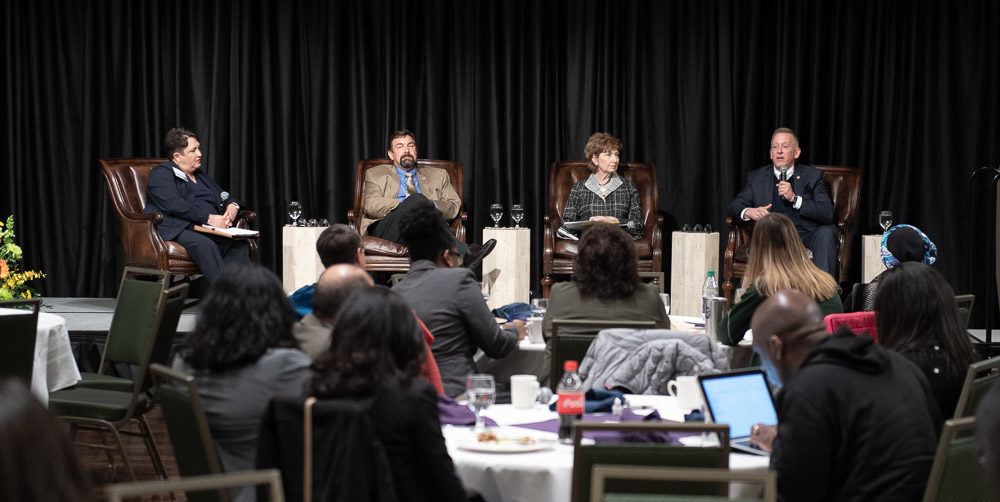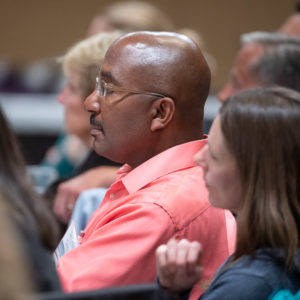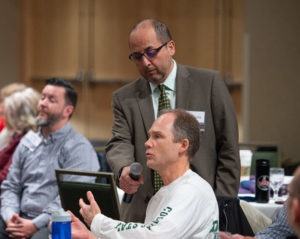
Shannon Archibeque-Engle (far left) from the Colorado State University Office of the Vice President for Diversity moderated the Presidents’ Panel during the Think Tank: Free Speech Summit, which featured CSU President and CSU System Chancellor Tony Frank; Dorothy Horrell, chancellor of University of Colorado Denver; and Timothy Mottet, president of CSU-Pueblo.
The light of privilege burns bright, but illuminates only a small pool of experience, according to Colorado State University President Tony Frank.
“It’s time to stick our heads outside that bright pool of light, let our eyes adjust, and take a look at what those without the same privilege see and experience every day.”
Frank spoke during the President’s Panel, presented as part of the Think Tank: Free Speech Summit at CSU on April 13. He was joined by Dorothy Horrell, chancellor of the University of Colorado-Denver, and Timothy Mottet, president of CSU-Pueblo, in a discussion moderated by Shannon Archibeque-Engle of the CSU Office of the Vice President for Diversity. All three leaders acknowledged that the biggest challenges facing them surround finding the balance between the free exchange of ideas that is part of the nature of college campuses and protecting all members of the academic community from hate speech and incidents of bias.
“Our most important work is really messy, but really, really important,” Horrell said. “It’s critical that in our role as an institution of higher education we develop and maintain a culture of respect for all, but in these times it’s not always easy to navigate.”
Mottet, who has been at the helm of one of the most racially diverse campuses in the state for less than a year, agreed.
“There’s a tension between wanting the opportunity and ability to express whatever is on your mind and supporting our value of inclusivity,” he said. “We need to navigate between these poles.”
Philosophy evolving

Campuses, because of their commitment to academic freedom and openness, have become a target for groups spreading racist, homophobic and anti-Muslim and anti-Semitic views. Frank acknowledged that the recent rise of such openly expressed sentiments at CSU has led him, as an academic, to re-examine some of his long-held beliefs in the absolute nature of free speech.
“The purpose of hate speech is not communication, or to debate opposing ideas,” he said. “Its purpose is to bully and intimidate, to create isolation and fear. And if we look at our campus as our students’ home while they are studying at CSU, it is the University’s role to ensure that they feel safe in their home so they can learn.”
CSU has made a conscious decision to acknowledge and publicly discuss incidents of hate and bias that have occurred on campus, and the University’s responses. This can leave the impression that things are worse here than at other institutions that remain silent when incidents happen, or do not respond, Frank acknowledged.
“We can’t prevent anyone from saying something repugnant,” Frank said. “But we can use our right of free speech to stand against it, and make them understand how far outside the norm of our community those sentiments are. We can let those attacked that they are not alone.”
(A video of the complete discussion will be available on the OVPD website soon.)
All-day summit
The Think Tank was presented as part of the Colorado Association of Diversity Officers in Higher Education, and attracted about 120 participants from campuses along the Front Range from Pueblo to Wyoming for a day of more than a dozen breakout sessions. Topics ranged from First Amendment legal issues to proactive public relations and admissions considerations, the importance of communication among groups impacted by incidents, the role of the administration in supporting faculty in the classroom, and how faculty and staff can help targeted students when they themselves are part of a targeted group.
Mary Ontiveros,CSU’s vice president for diversity, said that while the topic is extremely timely, it was chosen for its annual presentation by the organization last year.

“It’s something all campuses are dealing with, not just big campuses anymore,” she said. “It’s discussed at every professional conference, and people are really searching for answers and ways they can be prepared.”
Archibeque-Engle echoed Frank’s sentiments regarding the importance of discussing the subject publicly.
“Some schools are choosing to bury their heads in the sand, because it is painful to deal with in the short run,” she said. “But campuses need to lean in to it now to achieve greater benefits in the long run.”
Ontiveros said she was happy that during the president’s panel, Mottet pointed out that he was looking to Frank’s leadership in developing his own philosophy on creating a more inclusive culture on the Pueblo campus.
“We need both perspectives, the contributions of people who have been working on these issues for a long time and those of new people willing to take it forward,” she said.
Archibeque-Engle said that while diversity officers would like to eventually work themselves out of a job, she doesn’t see that happening anytime soon.
“I do think more people are ready to engage in the discussion of the importance of diversity and inclusion not only on our culture but on the work they do every day,” she said. “They no longer think of ‘diversity’ as an add-on, but as a part of our community.”